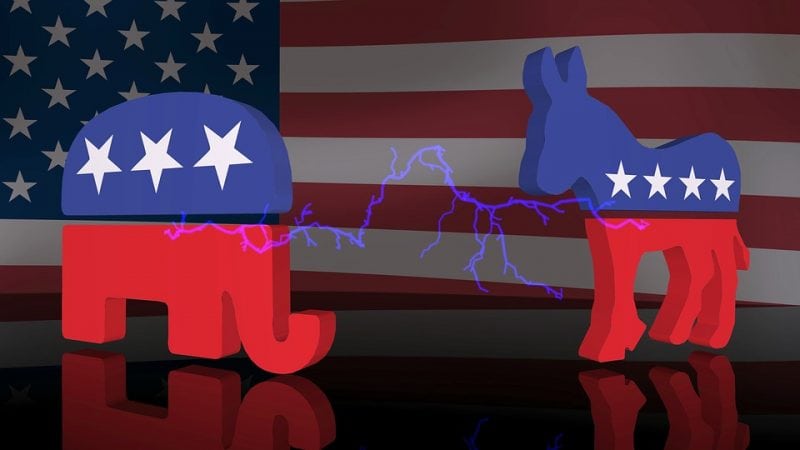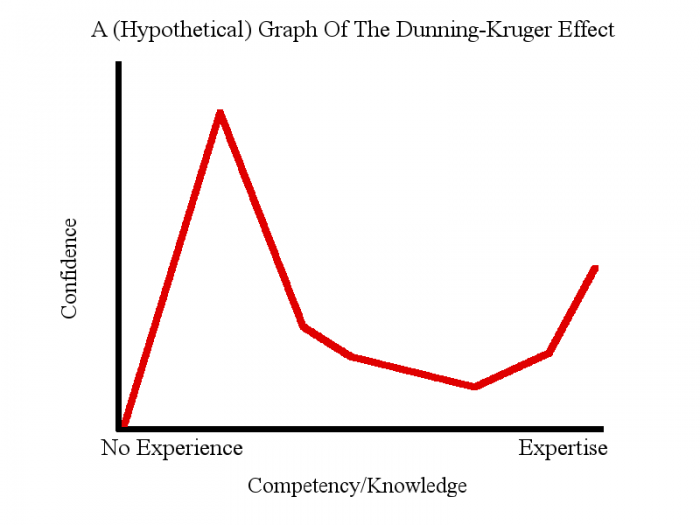
A recent study published in the journal Political Psychology finds that those who claim to be knowledgeable about political issues actually know less. The study not only found that those who are extremely confident about their political knowledge know less, but that the effect is even stronger when feelings of political partisanship come into play.
The study was conducted by Ian Anson, an assistant professor at University of Maryland, Baltimore. Anson explains the results of the study as a classic manifestation of the Dunning-Kruger effect.
The Dunning-Kruger Effect
The Dunning-Kruger effect is a cognitive bias that manifests itself when people of low competency in one area assess their competency or knowledge in that area as greater than it is, possessing a form of illusory superiority. The effect was originally described in a study done by David Dunning and Justin Kruger in 1999, and subsequent studies on the topic have found that many of the incorrect assumptions people make are driven by an ignorance of the subject matter, they essentially lack the knowledge to understand their lack of knowledge.
Anson says that in addition to the fact that those with little knowledge about a subject frequently overestimate their knowledge, those who genuinely know a lot about a particular topic are likely to discount and underestimate their knowledge of the subject.
Anson’s study involved 2606 adults from across the United States. Anson gathered their opinions using two surveys conducted online. The surveys collected information on people’s level of political knowledge by quizzing them on topics like the name of different political figures and national leaders, which party currently controls the House of Representatives, how many years a specific senator has served, and which of four different programs the US spends the least amount of money on.
The analysis of the survey results revealed that most of those who took the political quiz performed rather poorly and that those who performed the worst were the most likely to overestimate their level of knowledge (their performance on the quiz).

Photo: My Own
Motivated Reasoning
Anson says that the inspiration for the study came from observing how other scholars and fellow academics would discuss political issues on Twitter in the months leading up to the 2016 presidential election. According to Anson, many of the political psychologists he followed on Twitter would discuss the displays of ‘Dunning-Krugerish tendencies’ in those who voiced their strong political opinions over Twitter.
Anson notes that while many of the psychologists he followed were being somewhat tongue-in-cheek about the Dunning-Kruger effect (telling someone they are too ignorant to understand their ignorance an easy way to shut down discourse in the political arena), he was nonetheless inspired to research how the effect might apply to political topics. Anson says while reading up on the topic he noticed there were very few studies that examined the role of the Dunning-Kruger phenomena in the political science sphere. Anson wanted to find a way to apply the theory to political knowledge while also finding some way to account for the role of motivated reasoning driven by political partisanship.
Motivated reasoning refers to a tendency to make decisions based on emotionally driven biases, and it is frequently used to reduce cognitive dissonance (the dissonance that forms when confronted with the fact that you hold two or more contradictory beliefs/ideas). Much of Anson’s previous work revolved around motivated reasoning, and Anson says he was specifically interested in how partisanship may make the mind more susceptible to overconfident appraisals of knowledge.

Strong opinions may be supported by relatively little knowledge. Photo: RobinHiggins via Pixabay
Anson explained that the Dunning-Kruger effect is amplified by political partisanship:
Many Americans appear to be extremely overconfident in their political knowledgeability because they have no way of knowing how little they actually know about the world of politics (this is the so-called ‘double bind of incompetence’). But there’s a catch: when Republicans and Democrats engage in partisan thought processes, this effect becomes even stronger than before.
Political Partisanship And Discourse
According to Anson, when someone thinks about members of an opposing political party/tribe, they become even more sure that they possess more political knowledge than the average person. Anson even asked partisan participants to look at the results of a quiz filled out by (fictional) members of the other party and grade it, and he found that those who had performed poorly on the quiz gave out grades that were more reflective of their bias rather than the knowledge of the other person.
Anson says that the results indicated “a widespread failure of political discourse in the United States”. When people talk to a member of an opposing party they’ll usually rate their political knowledge as being higher and the political knowledge of the other person as lower, even if the other person is actually highly knowledgeable about political policies and facts. Anson says that the study has significant implications for “the breakdowns in political discourse” that are often witnessed in the political sphere today.
Anson admits that the study has its limitations and that more research will have to be done. As Anson notes, the fact that the surveys were conducted online means he couldn’t directly observe what happens when partisans talk with one another. Also, having the participants grade the scores of fictional persons from the other party is a “very artificial” way of determining what people actually think regarding the knowledge of someone from a different political tribe. Anson wants to actually get some people into a lab, to study political discourse and political overconfidence in a more grounded setting.
Anson says that as the study went on, he began to realize that he too was subject to the Dunning-Kruger effect. Going back over the literature on the subject had made him “acutely aware” of his own lack of knowledge regarding many things, and made him second-guess his confidence about his own academic work. (However, early reception of the study has been positive.) This gets to what many psychologists have said about the Dunning-Kruger effect: The point of learning about the effect isn’t to use it as a tool to undermine the knowledge of other people, it’s to be aware of your own shortcomings and limitations about the topics you (feel) you are well acquainted with.









